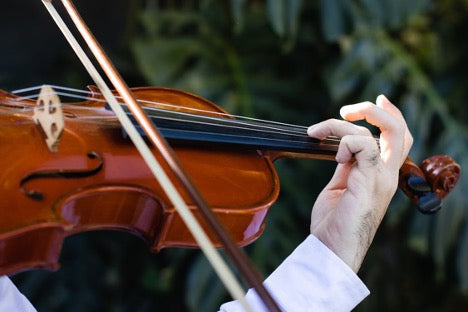Therapy benefits everyone. Contrary to popular belief, it's not just for serious illnesses like depression. Therapy provides new perspectives and introduces healthy coping mechanisms for everyone, regardless of their mental state. City Limits News observes that seniors are among those who can benefit from therapy due to the anxiety, depression, and grief they may feel from isolation and losing loved ones. Undergoing therapy helps them process these feelings.
Assisted living is a major channel through which seniors receive therapy. Maryville University notes that assisted living facilities have established programs that employ professionals like life coaches and therapists. Here, they provide counseling, therapy, and similar services to ultimately improve residents’ overall well-being.
One therapy that can help seniors is music therapy, including listening to music and playing instruments such as the violin. Below are the benefits of music therapy for seniors in assisted living:
It encourages social interaction
Seniors are more vulnerable to loneliness and isolation because they’re away from their loved ones. This can take a toll on their social well-being, leading to more severe conditions like depression. Music therapy aids this by encouraging social interaction. It’s an avenue for seniors to converse when they’re in group discussions, play instruments together, and sing or write songs. This is especially true if they’re learning or playing the violin. Violinists often play with accompaniment—an instrument that supports its sound, such as a piano. With music therapy, seniors can increase their social interactions to fend off the loneliness they may experience in assisted living facilities.
It enhances memory and cognitive function
Memory lapses and cognitive decline are common conditions that develop due to aging. Despite this, seniors need to keep their brains sharp. A music therapy and dementia study from Dalhousie University finds that music boosts memory and cognitive function in dementia patients. Listening to music, as well as learning to play a new instrument or piece, fosters memorization. As such, the researchers behind the study believe this is because musical activities stimulate and activate the brain to process sound and absorb information. There is even a claim that listening to Mozart can improve cognitive function, and it is unsurprisingly called the Mozart Effect. A study found that visual-spatial reasoning increased for many people after listening to Mozart. A senior's memory can therefore benefit from listening to music.
It improves communication with loved ones
Communicating with loved ones is another challenge faced by assisted living seniors. Being apart from their family and cognitive issues hinder them from maintaining strong bonds. A Berklee College of Music editorial entitled ‘Music Therapy in Geriatrics’ reports that music therapy helps promote communication between seniors and their loved ones. Dementia patients in nursing homes and their spouses were given individualized databases containing memorable music and photographs. By going through the audio and visual files, researchers concluded that music helps seniors relive past experiences and acts as a communication starter. If a senior used to play an instrument such as a violin, their loved ones could use this to prompt interactions for better communication.
It boosts physical health
Therapy isn’t limited to improving mental well-being. Music therapy research published in MDPI Healthcare concluded that it can boost physical health and prevent chronic illnesses. This results from the physical activities involved in music therapy, such as dancing and playing an instrument. Seniors also experienced an improved quality of life after receiving therapy, as suggested by the positive interactions they gained from it. This prompts them to take better care of themselves by continuing to engage in these interactions.
Music therapy for seniors encourages social interactions and better communication and enhances mental and physical well-being. Seniors should engage in music therapy to reap these advantages for better overall health.
Article written by Reena Joseph
Exclusively for The Long Island Violin Shop



Leave a comment